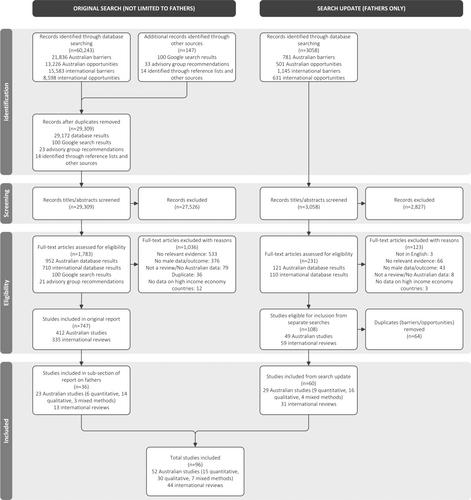Engagement with health supports benefits the whole family, yet few health services report successful engagement of fathers. Our aim was to describe available evidence on barriers and opportunities relevant to health system access for fathers.
Scoping reviews were conducted seeking empirical evidence from (1) Australian studies and (2) international literature reviews.
A total of 52 Australian studies and 44 international reviews were included. The most commonly reported barriers were at the health service level, related to an exclusionary health service focus on mothers. These included both ‘surface’ factors (e.g., appointment times limited to traditional employment hours) and ‘deep’ factors, in which health service policies perpetuate traditional gender norms of mothers as ‘caregivers’ and fathers as ‘supporters’ or ‘providers’. Such barriers were reported consistently, including but not limited to fathers from First Nations or culturally diverse backgrounds, those at risk of poor mental health, experiencing perinatal loss or other adverse pregnancy and birth events, and caring for children with illness, neurodevelopmental or behavioural problems. Opportunities for father engagement include offering father-specific resources and support, facilitating health professionals' confidence and training in working with fathers, and ‘gateway consultations’, including engaging fathers via appointments for mothers or infants. Ideally, top-down policies should support fathers as infant caregivers in a family-based approach.
Although barriers and opportunities exist at individual and cultural levels, health services hold the key to improved engagement of fathers.
Evidence-based, innovative strategies, informed by fathers' needs and healthy masculinities, are needed to engage fathers in health services.



